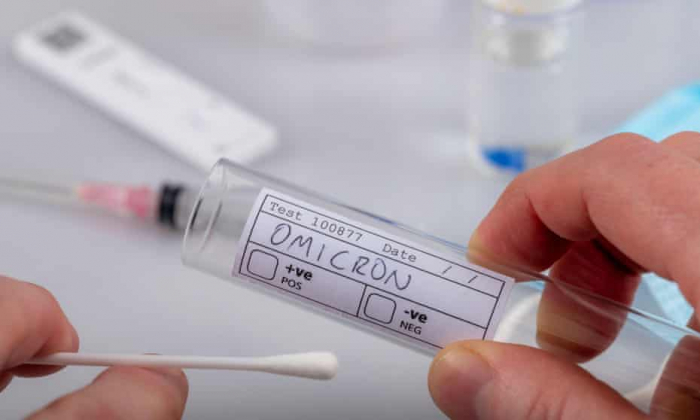Although widespread vaccination against COVID-19 remains the top priority, the emergence of the Omicron variant indicates that additional lines of defense are needed. The most promising complement by far lies in new-generation monoclonal antibody treatments.
As yet another new SARS-CoV-2 variant emerges and begins to spread – one with a worryingly large set of mutations that may make the virus more capable of evading our immune defenses – we are all being forced to reassess the strategies we have come to rely on for protection.
In many countries, like the United States, vaccines have been viewed as the primary ring of protection, allowing Americans to live in relative security from the virus. But the more we learn about the virus’s ability to dodge and elude the early lines of immune-system defense, the more obvious the need for additional measures becomes.
Instead of relying on a single layer of protection, we should adopt a “belt-and-suspenders” approach. Vaccines remain the primary ring of support – the belt keeping our protective pants on straight. But we would do well to add a set of suspenders for additional support, just in case the belt breaks under mounting pressure from the virus. Based on what we know, our best bet lies with the wider use of monoclonal antibodies for early treatment of COVID-19 and for long-term prevention and protection from the disease.
To see the importance of this approach, imagine a long-term care home in which one resident tests positive for COVID-19, or a ship or submarine at sea, where there would be no possibility of relief from continual and intense exposure in the event of an outbreak. If the people in these congregate settings were immediately administered a single dose of monoclonal antibody treatment, the odds of an infection in that group leading to severe disease would be reduced by up to 70%. And beyond protection from disease, the single dose would also have a powerful preventive effect for future infection, providing ongoing protection for up to eight months (depending on the therapy used).
As is the case for most antiviral drugs, monoclonal antibodies will need to be tailored to counter the particular strains circulating at any given moment. But the benefit remains: a single dose could protect people for up to eight months with no additional pills and no additional doses required. Consider what this intervention could mean for all the people in congregate living settings or at higher risk of severe disease. If you are older, morbidly obese, immunocompromised, or unable to mount an immune response after vaccination, new data show that you are much more likely than your healthier, vaccinated counterparts to have not only a breakthrough infection but also a more severe illness. This single injection could still save you.
Moreover, we already have a very good understanding of the potential adverse effects of monoclonal antibody treatments. All are manageable, which is more than can be said of the antiviral pill molnupiravir, which is currently before the FDA for emergency-use approval. Its potential side effects, heatedly discussed among the FDA experts who issued a very narrow approval, include potential birth defects and the possible mutagenesis of the virus itself, essentially supercharging the virus’s ability to create highly mutated variants. The side effects of other pills awaiting further study are still unknown.
The challenge with applying the belt-and-suspenders approach in the past has been the cost of production and the burden of delivery of first-generation monoclonal antibodies. Initially, the therapies could be administered only intravenously, in a clinical setting, over a period of hours. To be effective, the dose needed to be delivered shortly after symptoms appeared and before severe illness set in. Between the high costs and the extra administrative demand placed on overburdened health-care systems, this treatment option simply could not have been applied broadly as a preventive tool. Instead, it was limited to the select few who could both afford and access the required facilities.
But now there is a new generation of antibody treatments that can be administered by injection in a nonclinical setting, at a cost of roughly $400 per gram (according to my conversations with Indian manufacturers of monoclonal antibodies). At that price, a single dose should cost no more than $500 (while still allowing room for profit). Admittedly, $500 is a relatively steep price if the treatment is used broadly as a means of prevention. Nonetheless, it is far lower than the thousands of dollars a single IV infusion costs, and it pales in comparison to the cost of caring for a person hospitalized with COVID-19. Either way, these treatments offer a compelling return on investment.
What we need now is the same kind of rapid mobilization that delivered safe and highly effective COVID-19 vaccines in record time. That feat was made possible by a coordinated effort between government, global pharmaceutical manufacturers, and health-care payers to streamline the supply chain, improve the speed of delivery, and ensure affordability and accessibility for all those potentially in need.
COVID-19 testing also should be made more accessible, especially in congregate living settings, but also for individuals in general. Antibody testing for those at high risk should become commonplace.
Omicron’s emergence demonstrates that SARS-CoV-2 still has many tricks up its sleeve, the likes of which we may not even be able to imagine. Early tests suggest that monoclonal antibodies are holding up against the new variant. This is promising news, as is the news that the White House will create monoclonal antibody strike teams to administer the lifesaving treatment. While sartorial observers counsel against wearing a belt and suspenders together, public health calls for precisely such an approach.
William A. Haseltine, a scientist, biotech entrepreneur, and infectious disease expert, is Chair and President of the global health think tank ACCESS Health International.
Read the original article on project-syndicate.org.
More about:
















































